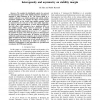Free Online Productivity Tools
i2Speak
i2Symbol
i2OCR
iTex2Img
iWeb2Print
iWeb2Shot
i2Type
iPdf2Split
iPdf2Merge
i2Bopomofo
i2Arabic
i2Style
i2Image
i2PDF
iLatex2Rtf
Sci2ools
CDC
2010
IEEE
2010
IEEE
Control of large 1D networks of double integrator agents: Role of heterogeneity and asymmetry on stability margin
We consider the distributed control of a network of heterogeneous agents with double integrator dynamics to maintain a rigid formation in 1D. The control signal at a vehicle is allowed to use relative position and velocity with its immediate neighbors. We examine the effect of heterogeneity and asymmetry on the closed loop stability margin, which is measured by the real part of the least stable eigenvalue. By using a PDE approximation, we show that heterogeneity has little effect while asymmetry has a significant effect on the stability margin. When control is symmetric, in which information from front and back neighbors are weighted equally, the stability margin decays to 0 as O(1/N2 ), where N is the number of agents, even when the agents are heterogeneous in their masses and control gains. In contrast, we show that arbitrarily small amount of asymmetry in the velocity feedback gains can improve the decay of the stability margin to O(1/N). With equal amount of asymmetry in both veloc...
| Added | 13 May 2011 |
| Updated | 13 May 2011 |
| Type | Journal |
| Year | 2010 |
| Where | CDC |
| Authors | He Hao, Prabir Barooah |
Comments (0)

